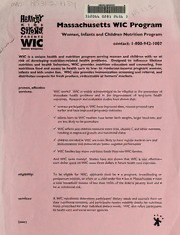
Healthy kids, strong parents: WIC works wonders PDF
Preview Healthy kids, strong parents: WIC works wonders
UMASS/AMHERST 312Dbb 2 1 2bSb 3 fl KIDS Massachusetts WIC Program feu Women, Infants and Children Nutrition Program p wic contact: 1-800-942-1007 WORKS WONDERS WIC is a unique health and nutrition program serving women and children with—or at risk of developing—nutrition-related health problems. Designed to influence lifetime nutrition and health behaviors, WIC provides nutrition education and counseling, free nutritious food and access to health care to low- to moderate-income pregnant women, infants and kids under five. WIC also provides immunization screening and referral, and distributes coupons for fresh produce, redeemable at farmers' markets. proven, effective services: WIC works! WIC is widely acknowledged to be effective in the prevention of immediate health problems and in the improvement of long-term health outcomes. Research and evaluation studies have shown that: y women participating in WIC have improved diets, receive prenatal care earlier and have improved pregnancy outcomes S infants born to WIC mothers have better birth weights, larger head size, and are less likely to be premature S WIC infants and children consume more iron, vitamin C and other nutrients, resulting in improved growth and nutritional status S children enrolled in WIC are more likely to have regular medical care and immunizations and demonstrate better cognitive performance •S WIC families buy more nutritious foods than non-WIC families. And WIC saves money! Studies have also shown that WIC is cost effective- each dollar spent on WIC saves three dollars in future health care expenses. eligibility: To be eligible for WIC, applicants must be • a pregnant, breastfeeding or postpartum woman, an infant or a child under five • live in Massachusetts • have a total household income of less than 185% of the federal poverty level and • be at nutritional risk. services: A WIC nutritionist determines participants' dietary needs and counsels them on their nutritional concerns, and participants receive monthly checks for nutritious foods prescribed for their individual dietary needs. WIC also refers participants to health care and social service agencies. (over) participation: Program participation reflects emphasis on services to high-risk and minority populations: 30% ofparticipants are Hispanic, 19% Black, 6% Asian/Pacific, and <1% Native American; less than 50% are White. WIC assigned caseload for state FY'02 is 127,670-85% of those estimated as eligible by the WIC needs assessment (updated with 1990 census and current birth, death, health and economic data). The Program expects to serve 29,109 women, 28,470 infants and 70,091 children. local programs: The Massachusetts WIC Nutrition Program has 36 local programs with over 155 sites throughout the state in community health centers, hospitals and social service agencies. foods: WIC food checks are redeemed at participating grocery stores or pharmacies for the specific foods listed on the checks. The WIC-approved foods on the check may be one or several ofthe following: milk, cheese, eggs, 100% fruit juice, iron-fortified cereal, peanut butter, dried beans, infant formula and infant cereal. Breastfeeding women receive an enhanced food package that includes carrots and tuna, with additional amounts ofcheese, juice and peanut butter or dried beans/peas. stores: Massachusetts has approximately 935 grocery stores and pharmacies that participate in WIC. For state FY'02, WIC will spend an estimated $68.7M in these stores. Massachusetts the first: In 1983, Massachusetts became the first state in the nation to provide supplemental funds to the WIC Program. State funding has grown from $2.2M to a level of$12.8M for the state FY'02 appropriation. Massachusetts is also the first state to guarantee that all eligible women, infants and children—up to 85% of estimated eligibles—receive WIC benefits. This action is a result ofthe landmark 1993 Childhood Hunger ReliefAct. funding: For state FY'02, Massachusetts WIC will receive $12.8M in state funds, $59.2M in federal funds, and an estimated $23.2M in infant formula rebate and milk reimbursement dollars. Of the total projected $95.2M, $68.7M will pay for food for WIC participants; the remainder is for community program nutrition services and other operational costs, which include banking, check processing and educational materials. administration: The Massachusetts WIC Nutrition Program is administered through the Massachusetts Department ofPublic Health. Howard Koh, MD, Commissioner Massachusetts Department of Public Health Mary Kelligrew Kassler, Director Massachusetts WIC Nutrition Program
